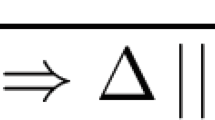Abstract
In this paper, we study multiplicative extensions of propositional many-place sequent calculi for finitely-valued logics arising from those introduced in Sect. 5 of Pynko (J Multiple-Valued Logic Soft Comput 10:339–362, 2004) through their translation by means of singularity determinants for logics and restriction of the original many-place sequent language. Our generalized approach, first of all, covers, on a uniform formal basis, both the one developed in Sect. 5 of Pynko (J Multiple-Valued Logic Soft Comput 10:339–362, 2004) for singular finitely-valued logics (when singularity determinants consist of a variable alone) and conventional Gentzen-style (i.e., two-place sequent) calculi suggested in Pynko (Bull Sect Logic 33(1):23–32, 2004) for finitely-valued logics with equality determinant. In addition, it provides a universal method of constructing Tait-style (i.e., one-place sequent) calculi for finitely-valued logics with singularity determinant (in particular, for Łukasiewicz finitely-valued logics) that fits the well-known Tait calculus (Lecture Notes in Mathematics, Springer, Berlin, 1968) for the classical logic. We properly extend main results of Pynko (J Multiple-Valued Logic Soft Comput 10:339–362, 2004) and explore calculi under consideration within the framework of Sect. 7 of Pynko (Arch Math Logic 45:267–305, 2006), generalizing the results obtained in Sect. 7.5 of Pynko (Arch Math Logic 45:267–305 2006) for two-place sequent calculi associated with finitely-valued logics with equality determinant according to Pynko (Bull Sect Logic 33(1):23–32, 2004). We also exemplify our universal elaboration by applying it to some denumerable families of well-known finitely-valued logics.
Similar content being viewed by others
References
Béziau J.-Y.: A sequent calculus for Łukasiewicz’s three-valued logic based on Suszko’s bivalent semantics. Bull. Sect. Logic Univ. 28, 89–97 (1999)
Dunn J.M.: Algebraic completeness results for R-mingle and its extensions. J. Symbolic Logic 35, 1–13 (1970)
Gentzen, G.: Untersuchungen über das logische Schliessen. Math. Z. 39, 176–210, 405–431 (1934)
Gödel K.: Zum intuitionistischen Aussagenkalkül. Anz. Akad. Wiss. Wien 69, 65–66 (1932)
Lukasiewicz J.: O logice trójwartościowej. Ruch Filoz. 5, 170–171 (1920)
Pynko A.P.: Definitional equivalence and algebraizability of generalized logical systems. Ann. Pure Appl. Logic 98, 1–68 (1999)
Pynko, A.P.: Functional completeness and axiomatizability within Belnap’s four-valued logic and its expansions. J. Appl. Non-Classical Logics 9(1/2), 61–105 (1999), Special Issue on Multi-Valued Logics
Pynko, A.P.: The completeness of derivable rules of labeled calculi for finite-valued logics. Bull. Symbolic Logic 8(1), 175–176 (2002), Abstract
Pynko A.P.: Semantics of multiplicative propositional signed sequent calculi with structural rules. J. Multiple-Valued Logic Soft Comput. 10, 339–362 (2004)
Pynko A.P.: Sequential calculi for many-valued logics with equality determinant. Bull. Sect. Logic 33(1), 23–32 (2004)
Pynko A.P.: A relative interpolation theorem for infinitary universal Horn logic and its applications. Arch. Math. Logic 45, 267–305 (2006)
Pynko A.P.: Distributive-lattice semantics of sequent calculi with structural rules. Logica Universalis 3(1), 59–94 (2009)
Rousseau G.: Sequents in many-valued logic I. Fund. Math. 60, 23–33 (1967)
Schröter K.: Methoden zur axiomatisierung beliebiger aussagen- und prädikatenkalküle. Z. Math. Logik Grundlagen Math. 1, 241–251 (1955)
Tait W.W.: Normal derivability in classical logic, The syntax and semantics of infinitary languages. In: Barwise, J. (eds) Lecture Notes in Mathematics, vol. 72, pp. 204–236. Springer, Berlin (1968)
Author information
Authors and Affiliations
Corresponding author
Additional information
The work is supported by the National Academy of Sciences of Ukraine.
Rights and permissions
About this article
Cite this article
Pynko, A.P. Many-Place Sequent Calculi for Finitely-Valued Logics. Log. Univers. 4, 41–66 (2010). https://doi.org/10.1007/s11787-010-0013-2
Received:
Accepted:
Published:
Issue Date:
DOI: https://doi.org/10.1007/s11787-010-0013-2



